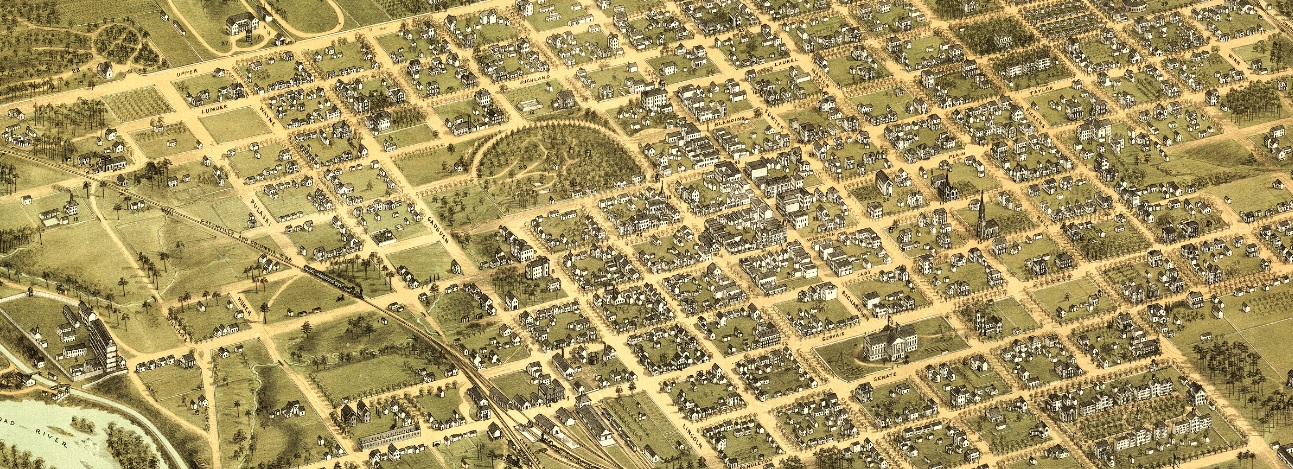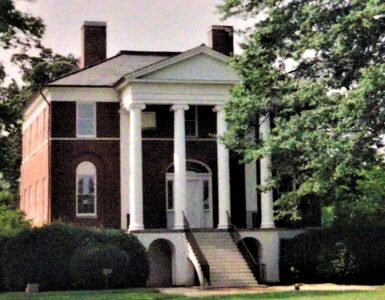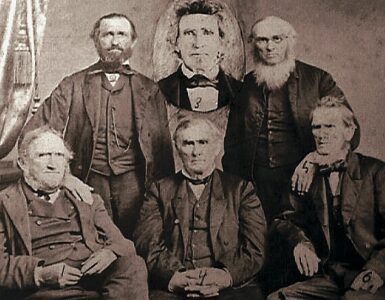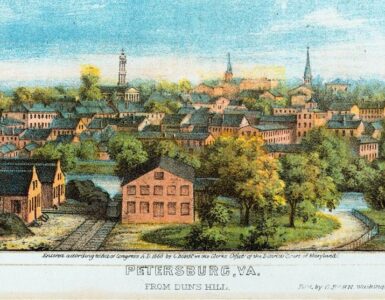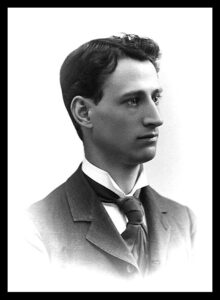 The evolution controversy at Columbia Theological Seminary extended for at least a decade and nearly caused the seminary to close. The source of the controversy was James Woodrow who was the inaugural Perkins Professor of Natural Science in Connection with Revelation. The Perkins chair was created in 1860 with a generous gift from Hon. John Perkins, Sr., who was a member of James A. Lyon’s congregation in Columbus, Mississippi. A turning point in the controversy was when the seminary board asked Woodrow to deliver an address explaining his views. On May 7, 1884 he lectured in First Church, Columbia, to a packed house that included seminary alumni, current students, faculty, and interested residents of the city. The lecture increased the polarization of the community over the issue of evolution with some individuals ready to brawl. Further fueling the fire was The Southern Presbyterian Review making the discourse available to the broader Presbyterian Church in the United States in the July 1884 issue. Leaders of those opposing Woodrow were faculty member John L. Girardeau and former faculty member B. M. Palmer (pastor, New Orleans), as well as former Union Seminary, Virginia, faculty member Robert L. Dabney (founder, Austin Seminary), while those supporting Woodrow included former faculty John B. Adger and Joseph R. Wilson. The synods overseeing Columbia voted against Woodrow’s view of evolution at their meetings in October which was followed by the seminary board asking for Woodrow’s resignation December 10, 1884. He refused, so the board removed him from the faculty, but the board’s action was not sustained by the synods in 1885, so he was returned to his chair. Then in 1886 he was removed from the faculty permanently. The theological issues with Woodrow’s views were never resolved and he continued as a minister in good standing in the PCUS despite having been removed from Columbia Seminary for teaching evolution. He would finish his teaching years at the University of South Carolina and for a time would be its president. He was moderator of the Synod of South Carolina in 1901 and delivered his retiring moderator’s sermon titled “One Lord, One Faith, One Baptism.” Issues related to the Woodrow case nearly ended the seminary as seen in the drop in graduates from twenty one in 1880, to six in 1881, and four for each of the years, 1882, 1883, and 1884.
The evolution controversy at Columbia Theological Seminary extended for at least a decade and nearly caused the seminary to close. The source of the controversy was James Woodrow who was the inaugural Perkins Professor of Natural Science in Connection with Revelation. The Perkins chair was created in 1860 with a generous gift from Hon. John Perkins, Sr., who was a member of James A. Lyon’s congregation in Columbus, Mississippi. A turning point in the controversy was when the seminary board asked Woodrow to deliver an address explaining his views. On May 7, 1884 he lectured in First Church, Columbia, to a packed house that included seminary alumni, current students, faculty, and interested residents of the city. The lecture increased the polarization of the community over the issue of evolution with some individuals ready to brawl. Further fueling the fire was The Southern Presbyterian Review making the discourse available to the broader Presbyterian Church in the United States in the July 1884 issue. Leaders of those opposing Woodrow were faculty member John L. Girardeau and former faculty member B. M. Palmer (pastor, New Orleans), as well as former Union Seminary, Virginia, faculty member Robert L. Dabney (founder, Austin Seminary), while those supporting Woodrow included former faculty John B. Adger and Joseph R. Wilson. The synods overseeing Columbia voted against Woodrow’s view of evolution at their meetings in October which was followed by the seminary board asking for Woodrow’s resignation December 10, 1884. He refused, so the board removed him from the faculty, but the board’s action was not sustained by the synods in 1885, so he was returned to his chair. Then in 1886 he was removed from the faculty permanently. The theological issues with Woodrow’s views were never resolved and he continued as a minister in good standing in the PCUS despite having been removed from Columbia Seminary for teaching evolution. He would finish his teaching years at the University of South Carolina and for a time would be its president. He was moderator of the Synod of South Carolina in 1901 and delivered his retiring moderator’s sermon titled “One Lord, One Faith, One Baptism.” Issues related to the Woodrow case nearly ended the seminary as seen in the drop in graduates from twenty one in 1880, to six in 1881, and four for each of the years, 1882, 1883, and 1884.
In the midst of the evolution controversy and its publications, intense arguments, and ecclesiastical decisions, the Anderson Intelligencer reported May 21, 1885 that there were to be changes in the faculty at Columbia Seminary,
“For the Professorship of Biblical Literature, the Board elected as Provisional Instructor, Mr. Geerhardus Vos. This gentleman is about twenty-four years of age, and is connected with the Free Church of Holland, of which his father is a minister. This church was founded in opposition to the rationalism and spiritual deadness which infected the established church in that country. Mr. Vos had just completed his classical and literary education in one of the gymnasia of Amsterdam when his father moved to this country. He pursued his theological education in the institution in the Northwest of which his father is a professor. After graduating there, he spent a year as teacher of Hebrew, Greek, and Latin. He then went to Princeton Seminary, where he had just graduated, being recognized by all his professors and classmates as facile princeps [easily the best] in a class of thirty-eight. To him has just been awarded the Hebrew Fellowship in that Seminary.
“Professor W. Henry Green states that Vos was most extraordinary in his power of acquisition and in the ripeness and balance of his judgment. The theme assigned him for the fellowship examination was ‘The Mosaic Origin of the Pentateuchal Code.’ He produced a dissertation of 250 carefully written pages on the subject, which I do not hesitate to pronounce masterly. I really have not seen a completer and more thorough defense of the Pentateuch against modern criticism anywhere. It would have done credit to a professor of long standing. He had read and digested everything of consequence that had been written on both sides, and his treatment was independent, candid, scholarly and decidedly evangelical.”
The Intelligencer ends by noting that “Mr. Vos was at present employed in revising this paper for the press. It has been accepted by a New York publisher, and will be published in a volume in the fall.”
Also reported by the Intelligencer was the election of Charles C. Hersman, a Princeton Seminary graduate and president of Westminster College, to replace Woodrow in the renamed Perkins Professorship of Science in Connection with Revelation and Christian Apologetics. The seminary community believed that it would be able to “go forward in the career of distinguished usefulness to the church which has hitherto marked its history.” But unfortunately, Columbia Seminary would not be able to advance, just yet.
The August 13, 1885 issue of the Yorkville Enquirer reported that “Mr. Vos, the young Princeton Student, who was recently elected ‘provisional instructor of biblical literature,’ in the Presbyterian theological seminary, after signifying his acceptance has now declined coming.” There was opposition to his going to Columbia because he was not ordained, which was a requirement for faculty. Recent publications indicated that the question of ordination would be brought up by the controlling synods against Vos’s appointment. Vos knew of this and withdrew himself as a potential professor, which left the seminary with the likely prospect of only two professors on faculty at the opening of the next session in September, John L. Girardeau and James D. Tadlock. Dr. Hersman, who was elected to fill Woodrow’s vacated chair declined his appointment as well.
Vos knew about the situation at Columbia through the press. If he had accepted the position and been approved by the synods, he would have been a first-time faculty member not only facing the challenges of teaching but also getting along with a divided faculty and Presbyterian community within the capital. It seems a simple thing for Vos to seek ordination in terms of the procedure, but consider J. Gresham Machen and his struggle that was resolved through ordination when he was thirty three (Stonehouse, 158ff). However, given W. H. Green’s glowing recommendation for Vos, would Princeton have let such a gifted candidate leave? Most likely not.
Barry Waugh
PS This year marks the centennial of the Scopes evolution trial that was held in Dayton Tennessee and ended July 21, 1925. See more on this site at “William Jennings Bryan, The Great Commoner.”
Notes—As originally written this post had the date for the issue of the Anderson Intelligencer as May 21, 1884, but the true date is the following year May 21, 1885 (thank you Danny Olinger). The header provides a section from the Library of Congress online collection map titled, “Bird’s eye view of the city of Columbia, South Carolina 1872.” The portrait is from Wikimedia Commons. If you want to learn more about Geerhardus Vos read the fine biography by Danny E. Olinger, Geerhardus Vos: Reformed Biblical Theologian, Confessional Presbyterian, Philadelphia: Reformed Forum, 2018, reviewed on Presbyterians of the Past HERE. Both newspapers cited in this post used a Columbia paper as their source. Vos’s The Mosaic Origin of the Pentateuchal Code is available on the Log College Press site HERE. Information about the Woodrow case is provided in C. N. Willborn, John L. Girardeau: Pastor to Slaves and Theologian of Causes, Ph.D. dissertation, Philadelphia: Westminster Theological Seminary, 2003; David B Calhoun, Our Southern Zion: Old Columbia Seminary (1828-1927)¸ Carlisle: Banner of Truth, 2012, which is reviewed HERE; and William Childs Robinson, “Observations on Evolution,” The Calvin Forum, August-September, 1940, 13-15. Also available is T. Watson Street, “The Evolution Controversy in the Southern Presbyterian Church with Attention to the Theological and Ecclesiastical Issues Raised,” Journal of the Presbyterian Historical Society, 37:4 (December 1959), 232-250. Columbia graduate Louis C. LaMotte has written Colored Light: The Story of the Influence of Columbia Seminary, 1828-1936, Richmond: Presbyterian Committee of Publication, 1937; and Professor Emeritus of Columbia Seminary Erskine Clarke has written To Count our Days: A History of Columbia Theological Seminary, Columbia: The University of South Carolina Press, 2019, Stonehouse, refers to J. Gresham Machen: A Biographical Memoir, by Ned B. Stonehouse, as published by the Committee for the Historian of the Orthodox Presbyterian Church; the pagination differs from other editions.


